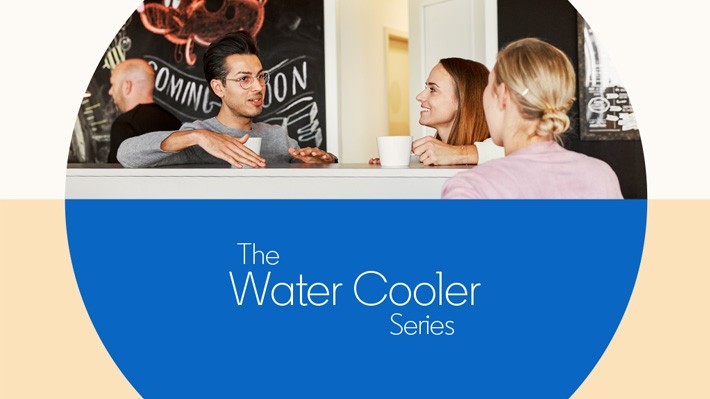Trends, tips, and best practices
The COVID-19 conversation is moving forward
In last month’s Watercooler analysis of content sharing on LinkedIn, we reported on how the topic of COVID-19 had swiftly swept aside almost every other subject. That takeover of the global conversation is now complete. In April, every one of the most shared posts in Europe, Latin America, the Middle East and Africa focused on the pandemic and its impact on work and life.
And yet, in some ways, the local themes and differences that we normally see are returning. The virus-related content that engages and influences audiences is developing a different tone in each region. This partly reflects the different stages of the coronavirus curve that countries have reached. However, it also reflects different priorities, instincts and motivations. As the Watercooler conversation moves through the different phases of the crisis it is starting to take on more of a local flavour. From a focus on philosophical and societal change in Europe to an appetite for ending lockdowns in the Middle East and North Africa, to a hunger for hopeful stories in Latin America: we can see different situations shaping the agenda at a local level.
From gender equality to leadership: the return of enduring Watercooler themes
The conversation is also starting to echo enduring themes that were a focus of content sharing on LinkedIn long before the crisis – but which are seen from a new perspective now. These themes help to explain the particular influence of a core group of three posts that feature prominently in every one of our four regional top tens.
The most striking of these themes is gender equality and leadership. By far the most influential post in our overall analysis is an article from Forbes. It points out that the most effective national responses to COVID-19 have all been led by women. It’s echoed in another popular post from The Atlantic that features in the top ten of every region bar Latin America, and which focuses on the leadership style of New Zealand’s prime minister Jacinda Arden.
The theme of leadership is explored again in the second of this core group of posts: an article published on LinkedIn by Bill Gates that puts forward a plan for ending the crisis in the United States, but which has ideas that resonate globally. It’s a post with many of the consistent characteristics of widely shared content on LinkedIn: executive thought-leadership that’s relevant, immediate and action-oriented.
The final of the three posts demonstrates another powerful source of influence on LinkedIn: data. In this case, the data relates to changing media consumption habits as a result of the COVID-19 crisis and the lockdowns it’s triggered. It satisfies audiences hunger for deeper understanding of the situation, and it’s also insight that many types of businesses can use to start to formulate a path forward.
The COVID-19 situation dominates the Watercooler because it understandably dominates the thinking of every professional on the planet. However, as the world moves through different phases of the crisis, the global conversation will do as well. We’ve moved from initial shock to an interest in how we can move forward, and what we can learn from those who are best placed to do so. I’m sure we’ll see more of the same in the months to come.
The Watercooler for Europe:
1. What Do Countries With The Best Coronavirus Responses Have In Common? Women Leaders
From Forbes
2. Coronavirus: les Français vont-ils devoir travailler plus après le confinement?From RTL
3. How COVID-19 Has Impacted Media Consumption, by Generation
From Visual Capitalist
4. What our leaders can do now
From Bill Gates on LinkedIn
5. L’être, l’avoir et le pouvoir dans la crise, par Dominique Strauss-Kahn
From Le Club des Juristes
6. New Zealand’s Prime Minister May Be the Most Effective Leader on the Planet
From The Atlantic
7. The reason Zoom calls drain your energy
From The BBC
8. Luxottica integra la cig al 100% e riduce lo stipendio dei manager
From Corriere Della Sera
9. Decathlon offre la totalité de ses stocks de masques Easybreath aux hôpitaux
From L’AND Innovation
10. Edgar Morin: “Nous devons vivre avec l'incertitude”
From CNRS Le Journal
Lessons from Europe’s Watercooler:
Even while many of its countries remained in lockdown, attention in Europe was starting to shift to the next phase of the crisis – the question of how the world has changed and how professionals can find a way to operate in it. There was also a development in the languages leading this discussion. For the first time in our Watercooler analysis, half of Europe’s top ten are in languages other than English. This might reflect a shift in the balance of thought leadership as countries move through the phases of the crisis at different speeds.
As the Watercooler discussion moves forward, it’s also becoming more varied. Audiences in Europe are interested in the social changes that might result from COVID-19, with the second most shared post dealing with comments from the leader of France’s employers’ association about the need for longer working hours to power recovery. They’re also aware of the need for a sustainable approach to remote working, which helps to explain strong sharing for a BBC feature revealing the science behind feelings of exhaustion on video calls. And they are ready to invest time in thinking philosophically about the experience the region is undergoing. Former IMF Director General, Dominique Strauss-Kahn contributed a lengthy essay on how the pandemic will change concepts of human existence, possession and power. Meanwhile, the respected philosopher Edgar Morin discussed how the world as a whole must become more comfortable with uncertainty.
The Watercooler for Latin America
1. Aluna cria máscaras transparentes para ajudar surdos na leitura labial
From Conti Outra
2. What Do Countries With The Best Coronavirus Responses Have In Common? Women Leaders
From Forbes
3. Uruguai e Argentina cortam despesas políticas para financiar sistema de saúde; Paraguai anuncia reforma do Estado
From O Globo
4. Rappi inicia sus primeras entregas con robots
From Forbes
5. How COVID-19 Has Impacted Media Consumption, by Generation
From Visual Capitalist
6. Garoto cria protetor de orelha para máscaras e doa a médicos e enfermeiros
From Só Notícia Boa
7. Não demita
From Não demita
8. What our leaders can do now
From Bill Gates on LinkedIn
9. Na Nova Zelândia, políticos reduzem seus salários em 20% por covid-19
From Exame
10. Como o coronavírus vai mudar nossas vidas: dez tendências para o mundo pós-pandemia
From El País
Lessons from Latin America’s Watercooler:
With Latin America at an earlier point in the COVID-19 curve than many other regions, content sharing remains focused on immediate, practical measures for dealing with the crisis. As in other regions, these vary from government measures such as the emergency budget measures reported on by O Globo, to innovations such as a business pioneering delivery by robots to enable greater social distancing. There’s also a direct call to action in the form of a widely shared manifesto imploring businesspeople not to lay off staff during the crisis, but to continue investing both in society and their own future growth.
Two of the top ten most shared posts focus on stories of young people designing solutions to problems caused by the crisis: a transparent mask to avoid excluding people who rely on lip-reading, and ear protectors for doctors and nurses suffering chafing from the masks they wear. They are tales of hope and human ingenuity that give audiences something positive to celebrate during difficult times.
The Watercooler for The Middle East and North Africa
1. What Do Countries With The Best Coronavirus Responses Have In Common? Women Leaders
From Forbes
2. What our leaders can do now
From Bill Gates on LinkedIn
3. Data-Driven Prediction of COVID-19 Pandemic End Dates
From SUTD Data-Driven Innovation Lab
4. Zoom is now worth more than American Airlines, Expedia and Hilton combined
From Moneycontrol News
5. New Zealand’s Prime Minister May Be the Most Effective Leader on the Planet
From The Atlantic
6. Apple and Google partner on COVID-19 contact tracing technology
From Google
7. Virginia Business Launches Recruiting and Management Program For COVID-19 Contact Tracing
From AM LLC
8. How COVID-19 Has Impacted Media Consumption, by Generation
From Visual Capitalist
9. An Hermès Boutique in China Made $2.7 Million in One Day After It Reopened
From The Robb Report
Lessons from The Middle East and North Africa’s Watercooler:
More than in any other region, the Watercooler conversation in the Middle East and North Africa is being shaped by the initiatives of brands and businesses in response to the current crisis. It’s also a conversation that looks forward, eager for initiatives that can help to loosen lockdowns and considering the prospects for economic recovery.
Audiences responded to examples of leadership from Google and Apple, with wide sharing for the announcement of their partnership to develop a contact tracing app. Also setting the agenda was the US finance company Gravity, the subject of an Inc. article praising its efforts to avoid layoffs, and the research business AM LLC, which has launched a contact-tracing training programme. Data analysis from Singapore University’s Innovation Lab generated attention through its attempts to predict end-dates for the pandemic, while a strong return to trading for Hermès in China offered hope for a speedy economic recovery.
The Watercooler for Sub-Saharan Africa
1. What our leaders can do now
From Bill Gates on LinkedIn
2. What Do Countries With The Best Coronavirus Responses Have In Common? Women Leaders
From Forbes
3. South Africa's ruthlessly efficient fight against coronavirus
From The BBC
4. How COVID-19 Has Impacted Media Consumption, by Generation
From Visual Capitalist
5. The Kenyan factory that transformed into a surgical mask assembly line overnight
From The Washington Post
6. New Zealand’s Prime Minister May Be the Most Effective Leader on the Planet
From The Atlantic
7. #AfricavsVirus Challenge
From #AfricavsVirus
8. Faouzi Berrahma met au point un masque intelligent ainsi que d’autres projets capables de lutter contre le coronavirus
From Radio Algérienne
9. Tesla is shipping FDA-approved ventilators to hospitals around the world free of charge during the coronavirus pandemic
From Business Insider
10. L’être, l’avoir et le pouvoir dans la crise, par Dominique Strauss-Kahn
From Le Club des Juristes
Lessons from Sub-Saharan Africa’s Watercooler:
In every edition of our Watercooler so far, Sub-Saharan Africa has been quick to share stories of local initiative. This remains true of the response to COVID-19: the well-known Algerian inventor who has developed three separate solutions to issues caused by the virus, the Kenyan factory that managed to redeploy an entire assembly line to making surgical masks overnight, and the call for ideas to address different virus-related challenges. However, audiences are most interested of all in a more nuanced story of the battle against the pandemic. South Africa’s efforts at containing coronavirus have drawn international praise – but this widely shared BBC feature also dwells on the human cost of its tough lockdown measures.
The Watercooler conversation in Africa values stories of hope and human spirit – but it’s alive to the complexities behind narratives as well.
Topics: Trends, tips, and best practices
Related articles



